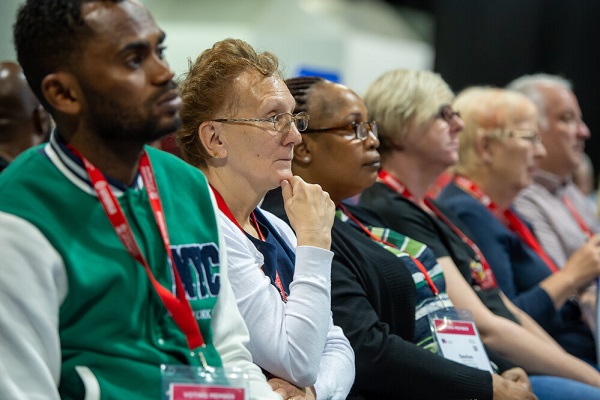Congress Agenda
We received an incredible 149 ideas for debate at RCN Congress this year. The Agenda Committee went through a thorough selection process on 16 and 17 January and put forward a proposed Congress business agenda to RCN Council, which they approved on 25 January.
If you have an interest in artificial intelligence, access to controlled drugs, genomics, virtual wards, green health care, or political influencing, come along to our flagship annual nursing event in south Wales to get your voice heard. We’d love you to join us to help shape the work of your union.
Below is an agreed running order for the agenda; we aim to cover 7 debates each day, however the exact running order might be subject to change.
If you have a debate idea, you can still propose an emergency debate for consideration in June.
What’s on the agenda?
Definition of nursing (Matter for discussion)
Submitted by the Public Health Forum
That this meeting of RCN Congress discusses how the RCN’s Definition of Nursing can be utilised to demonstrate the value of nursing.
Should nursing support workers be regulated? (Resolution)
Submitted by the Nursing Support Workers Committee
That this meeting of RCN Congress asks the RCN to lobby the government on the mandatory regulation of the nursing support workforce.
Are you empowered to speak up? (Resolution)
Submitted by the Outer North West London Branch
That this meeting of RCN Congress asks RCN Council to lobby government for more support for nursing staff raising concerns.
Crumbling buildings: the best place for care? (Matter for discussion)
Submitted by the Greater Liverpool and Knowsley Branch
That this meeting of RCN Congress discusses the effect on patient care of the lack of maintenance in regards of the NHS estate.
Emergency debate
The evolution of AI in health care (Matter for discussion)
Submitted by the Digital Nursing Forum
That this meeting of RCN Congress discusses the potential barriers and opportunities that artificial intelligence can bring to nursing.
Statutory provision of CPD (Resolution)
Submitted by the Cwm Taf Morgannwg Branch
That this meeting of RCN Congress asks RCN Council to lobby governments to place a statutory duty on all employers to provide contractual, fully funded continuing professional development (CPD) to deliver safe and effective care.
Nursing apprenticeships (Resolution)
Submitted by the UK Learning Reps Committee
That this meeting of RCN Congress calls on RCN Council to lobby government for changes to improve the use of the apprentice levy to ensure 'fit for purpose' nursing and nursing associate programmes.
Support for newly qualified and student nurses (Resolution)
Submitted by the Eastern Board
That this meeting of RCN Congress calls on RCN Council to declare a crisis in working conditions and quality of support available to students and newly registered nurses.
Immigration regulations for the nursing workforce (Resolution)
Submitted by the Essex Branch
That this meeting of RCN Congress urges RCN Council to lobby Governments regarding the implications of new immigration rules on the current and future international workforce.
Support for internationally educated nursing staff (Matter for discussion)
Submitted by the Dorset Branch
That this meeting of RCN Congress discusses what needs to be done to support internationally educated nurses and midwives to settle in the UK.
Assisted dying (Resolution)
Submitted by the Greater Liverpool and Knowsley Branch
That this meeting of RCN Congress supports the principles of assisted dying.
Access to controlled drugs in care homes (Resolution)
Submitted by the Pain and Palliative Care Forum
That this meeting of RCN Congress calls on RCN Council to lobby government to amend the law to improve access to controlled drugs in care homes.
Redefining learning disability nursing (Matter for discussion)
Submitted by the Learning Disability Nursing Forum
That this meeting of RCN Congress discusses whether the title registered nurse in learning disabilities remains appropriate for contemporary practice.
Emergency item
Digitised patient records: a data security risk? (Matter for discussion)
Submitted by the UK Stewards Committee
That this meeting of RCN Congress discusses the risks involved in the digitalisation of patient records.
Virtual wards: the pros and cons (Matter for discussion)
Submitted by the General Practice Nursing Forum
That this meeting of RCN Congress discusses the impact of virtual wards on the work, education and development of the nursing workforce and on patients.
Registered nurse substitution (Matter for discussion)
Submitted by the Outer North West London Branch
That this meeting of RCN Congress discusses what safeguards are required to protect against nurse substitution across all settings.
Patient flow: is it patient-focused? (Matter for discussion)
Submitted by the South Birmingham Branch
That this meeting of RCN Congress discusses whether the continuous focus on patient flow is a detriment to patient health and safety.
Decriminalising abortion (Resolution)
Submitted by the Women's Health Forum
That this meeting of RCN Congress requests that RCN Council support the calls for the decriminalisation of abortion across the UK.
Emergency Item
Genomics competencies (Resolution)
Submitted by the Greater Bristol Branch
That this meeting of RCN Congress calls on RCN Council to support the introduction and embedding of genomic competencies within the nursing profession.
Social media and nursing (Matter for discussion)
Submitted by the UK Stewards Committee
That this meeting of RCN Congress discusses the advantages and risks of social media for the nursing workforce.
Improved health care for the "unseen" (Resolution)
Submitted by the Dorset Branch
That this meeting of RCN Congress asks RCN Council to lobby the government to mandate specialist accessible health care for people who experience rough sleeping.
Nursing staff working in social care (Resolution)
Submitted by the CYP Continuing and Community Care Forum
That this meeting of RCN Congress recognises the value of, and need for, senior nursing leadership within social care across the UK.
Political influencing (Matter for discussion)
Submitted by the West Yorkshire Branch
That this meeting of RCN Congress discusses how we effectively promote the nursing agenda in an election year.
How can we achieve a greener health care system? (Matter for discussion)
Submitted by the Dorset Branch
That this meeting of RCN Congress discusses how health care staff can reduce the carbon footprint of health care.
The value of reps (Matter for discussion)
Submitted by the Greater Liverpool and Knowsley Branch
That this meeting of RCN Congress discusses the RCN's 'offer' to its trade union representatives.
Emergency item
The future of RCN boards and branches (Matter for discussion)
Submitted by the Eastern Board
That this meeting of RCN Congress discusses the future of board and branches.
Congress 2024 Agenda
The debate agenda at Congress is set entirely by our members. There are three types of debate:
- Resolutions – Members debate an issue and then vote on it.
- Matters for discussion – Members debate an issue but don’t vote on it.
- Emergency items – Members can submit these after the agenda submission closing date, which was 5 January this year. They must be on a matter or issue that has arisen since the closing date. They can be resolutions or matters for discussion, and can be submitted up to and during Congress week.
For more information, please read the rules of Congress.
How do debates work at Congress?
We aim to cover about seven debates each day, and 30 debates in total. We publish the running order ahead of Congress, but it may vary, for example when emergency items are added.
Each debate runs for up to 25 minutes. Timings might be amended where appropriate.
Debates run like this:
- The debate is proposed by a member from the branch, forum or committee that submitted it. They have five minutes to introduce it.
- If the debate is a resolution, it’s seconded by a member from another branch, forum or committee. Seconders speak for two minutes.
- Any member who would like to speak is then invited to put forward their views on the topic. They can speak for up to two minutes.
- The proposer returns to close the discussion and give a ‘right to reply’ to sum up and clarify points raised.
- If the debate is a resolution, the voting members are asked to vote.
Why take part in a Congress debate?
More to look forward to at Congress

Browse our exhibition
Our exhibition connects you with companies that can help improve the patient experience and further your career.
See who is exhibiting this year

Learning and wellbeing
Invest in your professional and personal development with our dynamic learning and wellbeing programme – full of inspiring sessions to satisfy your mind, body and soul.
More about this year's programme
Page last updated - 09/04/2024







